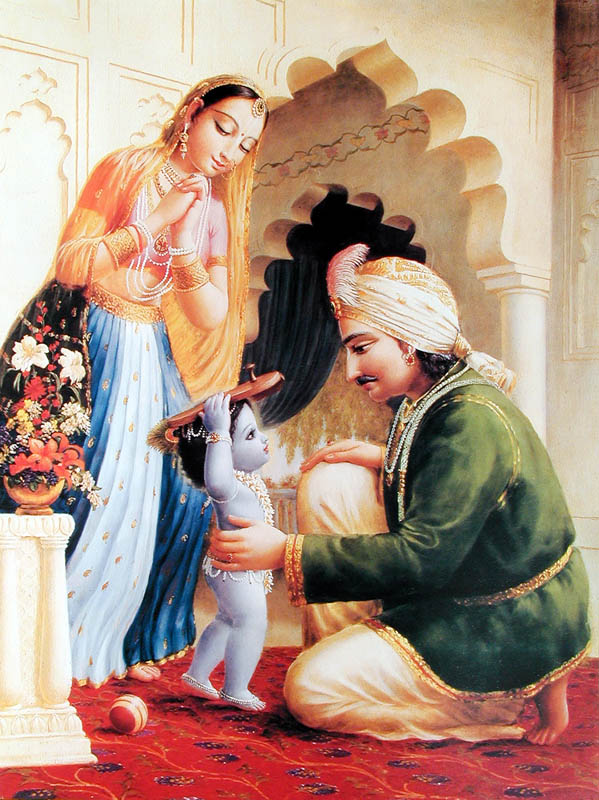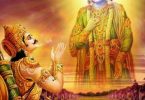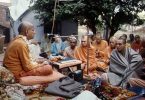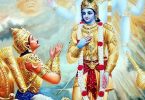Question: How to reconcile the contradiction between our standard understanding that Nanda Maharaja and Yasoda are nitya-siddha devotees, eternally situated as the father and mother of Krsna in his eternal unmanifest pastimes, or aprakata-lila in Goloka – while SB 10.8.48-50 indicate that Droëa and Dhärä ‘became’ Nanda and Yaçodä?
Answer by Romapada Swami:
It is correct that Krsna’s relationship with Nanda and Yaçodä is eternal. The scriptural references below explain this apparent contradiction – namely Chapter 8 of Canto 10 making reference to Drona and Dhärä becoming Nanda and Yaçodä. Read slowly, and carefully.
Note: At the very end of these scriptural quotes regarding Drona and Dhärä, you will find Laghu Bhagavatamrita’s explanation of how the order of Brahma given to the devas (in Chapter 1 of Canto 10) resulted in other ‘partial expansions’ of devas entering into the bodies of associates of Krsna, for the purpose of assisting in His pastimes.
- Krsna Sandarbha 151-153
“Droëa and Dhärä were amças (partial expansions) of Nanda and Yaçodä, and merged into them when they appeared on earth with Kåñëa.”
“It is correctly said that his relationship with Nanda and Yaçodä is eternal. Thus the verses in chapter nine until verse 20 negate the story of Droëa and Dharä of the previous chapter–since it is not proper to insist on a previous statement which is contradictory to a later statement.”
“The description of the eternal parenthood of Nanda and Yaçodä (Chapter 9) is given after the description of their previous birth as Droëa and Dharä (Chapter 8). If there are two contradictory statements in the scriptures, the second statement should be accepted, and the previous statement should be interpreted so that it does not contradict the later statement. This rule of interpretation is expressed in the Vedänta-sütra.”
“The truth is that Droëa and Dharä are partial expansions (aàça-avatära) of Nanda and Yaçodä, Kåñëa’s eternal parents in the spiritual world. They descended to this material world, just as the Lord Himself did in order to display His pastimes on earth.”
- Garga-saàhitä 1.15.6–10
“Once, the partial expansions of Nanda and Yaçodä appeared in Svarga as the demigods Droëa and Dharä. Droëa was one of the eight Vasus, and, as a great devotee of Lord Viñëu, he ruled a kingdom in heaven. Because they were childless, Droëa and Dharä went to Mount Mandara and implored Lord Brahmä to give them the Supreme Lord as their son. Lord Brahmä smiled and assured them that their desire would be fulfilled.
“When the time came for Kåñëa’s prakaöa-lélä on earth, Droëa and Dharä appeared in Gokula in accordance with their previous desire. However, Kåñëa’s eternal parents, Nanda Mahäräja and Mother Yaçodä, who were the original counter-wholes of Droëa and Dharä, had also appeared in prakaöa Vraja, as they always do upon Kåñëa’s descent. Thus, Droëa entered the body of Nanda Mahäräja and Dharä entered the body of Yaçodä-devé. In this way, when Kåñëa was finally born, Droëa and Dharä were able to share the bliss of being his parents.”
Summary: Nanda Mahäräja and Yaçodä-devé, who were fortunate enough to enjoy the childhood pastimes of Kåñëa in his prakaöa-lélä, were the combined form of two sets of personalities: the eternal parents of Kåñëa within Goloka, Nanda and Yaçodä, as well as the partial expansions of those same personalities from Svarga, Droëa and Dharä.
3. Gopal Campu
- “Accompanied by his wife, Parjanya came to Vrndavana. Then, standing in Nanda’s assembly as Bhisma stood in the assembly of wonderful fighters, Upananda affirmed that his own name meant ‘the follower of Nanda’. Accepting Upananda’s words, Nanda accepted everyone there as his eternal subjects. He ruled over them and protected them.
- “Nanda’s actions were wonderful:
“Nanda was always respectful to his father. In his country religion was never in distress. In his country prosperity was never crippled. In his country propensity always grew more and more.
- “Everyone in Vraja lived at the height of propensity. Still, one worry gradually blossomed amongst them. “Our king, who is more dear to us than life, has no children,” they thought. In the course of time this worry troubled Upananda and everyone else. Then Nanda and Yasoda, the rulers of Vraja, became overwhelmed with the desire for a child. As time passed that desire grew stronger and stronger.”
- Snigdhakanta said, “Why did Nanda’s friends and kinsmen not perform a yajna to give Nanda children? Why were intelligent Nanda and Yasoda so upset that they had no children? They were already king and queen of Vraja. Why did they yearn for children? Why did that desire become stronger and stronger as time passed?”
- Madhukantha said, “A yajnas was performed, but it brought no result.”
- Snigdhakantha said, “Why? Why was there no result?”
- Madhukantha said, “In private, glorious Nanda and Yasoda spoke about this. Nanda said, ‘Dear wife, why do my grief-stricken relatives perform yajnas and other ceremonies so I may have children? My heart yearns to have a glorious son. Why is that desire not fulfilled? My heart cannot say. If merciful Lord Narayana, who is attained by the followers of the Vedas, is kind to me, then I will certainly have a glorious child. Perhaps my desire is like a parijata flower, which fools imagine to float in the sky.'”
- Then Snigdhakanta thought, “Krsna is more sweet and charming than Lord Narayana Himself. It is not wrong to say this. This truth is confirmed by Srimad-Bhagavatam (3.2.12) in these words: “The Lord appeared in the mortal world by His internal potency, Yogamaya. He came in His eternal form, which is just suitable for His pastimes. These pastimes are wonderful for everyone, even for those proud of their own opulence, including the Lord Himself in His form as the Lord of Vaikuntha. Thus His (Sri Krsna’s) transcendental body is the ornament of all ornaments.'”
- Then Snigdhakantha openly said, “Then? Then?”
- Madhukantha said, “Then Yasoda, Nanda’s beautiful wife, said, “What reply can I give?”
- “Then Nanda said: ” ‘I see a dark boy with large restless eyes. I see Him playing, and I see him sitting on your lap, and I see Him drinking milk from your breast. When I see Him am I dreaming or am I awake? I do not know. O saintly wife, please tell me the truth: Do you also see Him in your heart?’
- “Yasoda said, ‘O glorious husband, I have also seen this child in my thoughts, but I was too shy to tell you. This desire can never be attained. We should not keep it in our hearts.’
- “Nanda said, ‘Although it is my destiny to be childless, I will take shelter of Glorious Lord Narayana, the controller of the worlds. With His help my desire will be fulfilled. This I know. What has never been seen or heard of before He can place before everyone’s eyes. He can do any impossible deed.’
- “Yasoda said, O master, we should serve Lord Narayana.”
- “Nanda said, ‘Good. What service shall we perform?’
- “Yasodasaid, “We could follow the dvadasi vow.’
- “Nanda happily said, ‘What you say is good. The desire to follow this vow has now sprouted in my heart. We will follow it.’
- “When the two of them decided in this way, the demigods made a great sound of dundubhi drums, a sound that filled all directions.”
- Hearing this description of his thoughts and desires, Nanda felt his heart melt. To the young poet he gave a gift of his own glistening ornaments. His wife, glorious Yasoda, gave the poet a great necklace of sapphires.
- Snigdhakantha earnestly said, “What happened then?”
- Madhukantha said, “When Nanda and Yasoda had passed a year of following this vow, the Supreme Personality of Godhead appeared before them both in their dreams. He said, ‘O devotees very attached to Me, why are you so troubled? A delicate boy dark and glorious like an atasi flower will become your son. You will be able to gaze on Him always. To increase your love for Him, this boy becomes your son kalpa after kalpa. Following My order, you appeared in your amsa-kala forms as Drona and Dhara in the world of the demigods. To fulfill that which others cannot attain, you took birth on the earth in this place, a place glorified in Srimad-Bhagavatam (10.14.34). Please know that your glorious desire will soon be fulfilled.’
- “After speaking these words, the glorious Supreme Personality of Godhead at once disappeared. Suddenly awakening, Nanda andYasodabecame as if plunged in an ocean of nectar. Telling each other what they had seen, they were filled with wonder.”
- In his heart Snigdhakantha thought, “Now my questions are answered. When He said, ‘You two will attain Him as your son’, that is what the Supreme Lord meant. That is what Garga Muni meant when he said (Srimad-Bhagavatam 10.8.14): ” ‘For many reasons, this beautiful son of yours sometimes appeared previously as son of Vasudeva. Therefore, those who are learned call this child Vasudeva.’
Additional Quotes:
Laghu Bhagavatamrta 1.5.441
When the portions of the devatäs through the order of Brahmä appeared on earth, the portions of Vasudeva and others (aàça) such as Kaçyapa who were residing in Svarga, merged with Vasudeva and others (who were their aàçé) of the eternal pastimes and took birth from Çürasena {father of Vasudeva} and others.
VCT’s COMMENTARY
This verse explains how the manifested pastimes take place. Brahmä gave the following order, according to Bhägavatam:
“While in trance, Lord Brahmä heard the words of Lord Viñëu vibrating in the sky. Thus he told the demigods: ‘O demigods, hear from me the order of Kñérodakaçäyé Viñëu, the Supreme Person, and execute it attentively without delay. Before we submitted our petition to the Lord, He was already aware of the distress on earth. Consequently, for as long as the Lord moves on earth to diminish its burden by His own potency in the form of time, all of you demigods should appear through plenary portions as sons and grandsons in the family of the Yadus.” SB 10.1.21-22
When portions of the devatäs appeared on earth, the portions of the eternal associates such as Vasudeva*, Nanda and others – namely, secondary forms such as Kaçyapa and Droëa – merged with the eternal associates Vasudeva* and Nanda, when Vasudeva and Nanda took birth on earth from Çürasena*, Parjanya and others.
*{Çürasena was the father of Vasudeva, while Parjanya was the father of Nanda. Both brothers, Çürasena and Parjanya, were sons of Devaméòha. Çürasena had ten sons, of whom Vasudeva was the chief. Çürasena gave one of his five daughters, Påthä, to his friend King Kuntibhoja to raise as his daughter, and therefore she was also named Kunté.}
Gopal Campu 2.3.19: “Devamiòha, who personified all the best qualities of the Yadu dynasty, whose is praised in all the çrutis and Puräëas, lived in Mathurä. The best of kñatriyas had two wives. One was of a kñatriya family and the other was of a vaiçya family. They bore two children named Çüra and Parjanya. Çüra produced Vasudeva and others. Parjanya, because of his mixed parentage became a vaiçya and worked with cows. He lived in Mahävana. From his childhood Parjanya would worship the brähmaëas just on seeing them and gave them everything to fulfill their desires. He was affectionate to them as Vaiñëavas. He carried out activities to the best of his knowledge and worshiped Viñëu his whole life. His mother’s family was the praiseworthy ornament of the vaiçya community. The wise glorified the mother’s family by calling them abhéra and because of that her family line had attained excellence.”
{Devamiòha, a kñatriya, had one wife of äbhéra descent (brähmaëa and vaiçya). Her child was Parjanya. Parjanya had five sons including Nanda.}
*Sri Krishna Caitanya – Nishikant Sanya, Vol. 1, Introductory Section: “As the different gods prepare to descend into this world through the medium of the series of their respective subjective portions (amsas), the heavenly plenary portions of Vasudeva, etc., such as Kasyapa, etc., merging with their original sources (amsis), viz., Vasudeva, etc., who belong to the eternal Divine Leela, appear in Mathura.”







